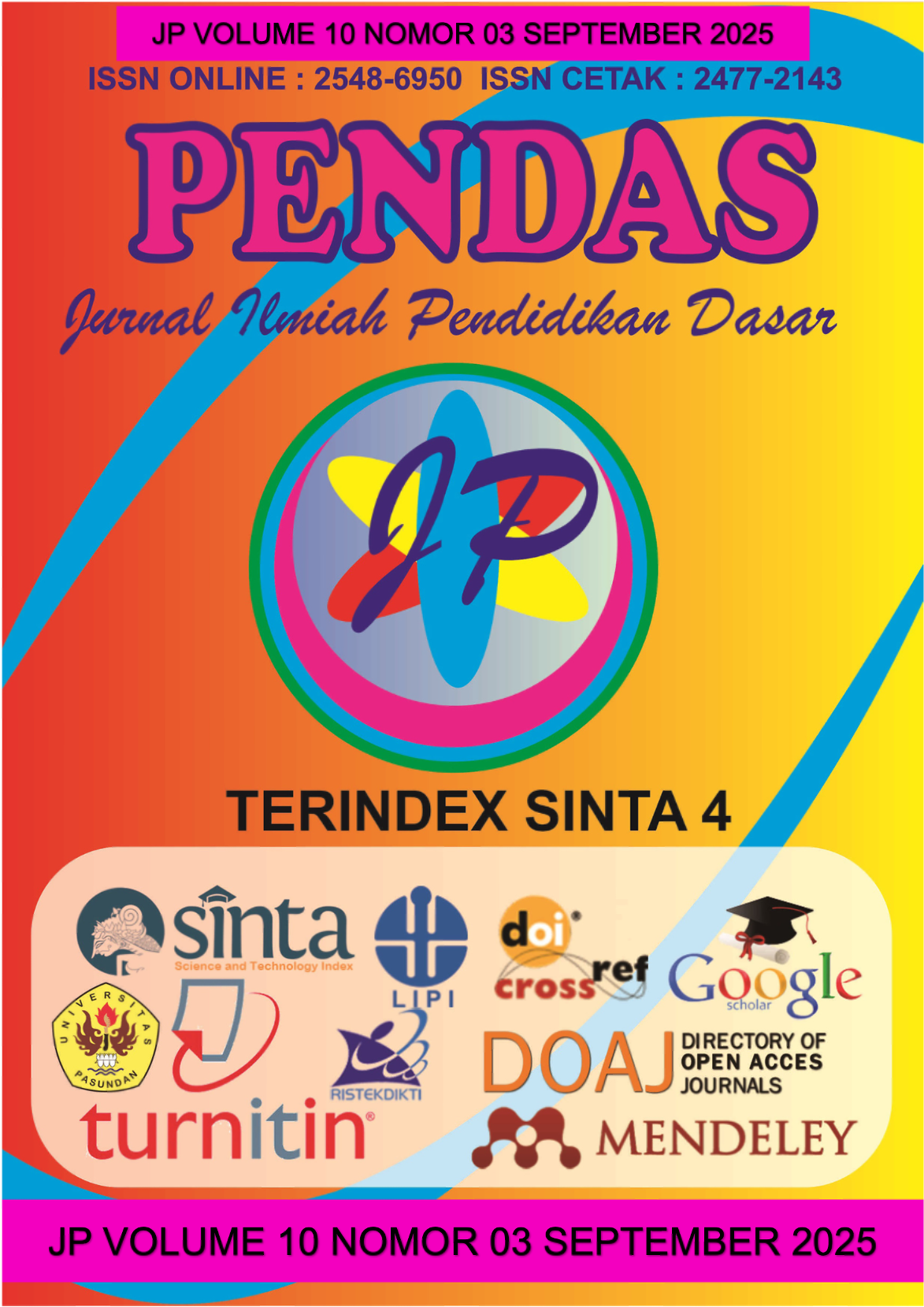PROFIL LITERASI SAINS SISWA SD DALAM PROGRAM KAMPUS MENGAJAR ANGKATAN 8
DOI:
https://doi.org/10.23969/jp.v10i03.31615Keywords:
science literacy, teaching campus 8, elementary, descriptive survey, BandungAbstract
Literacy skills are important for students to have in facing the development of 21st
century. This is quite fundamental in order to be able to solve problems amidst
increasingly complex issues. This study aims to describe the profile of science
literacy skills of students in Bandung Regency and Bandung City which schools
received the Kampus Mengajar (KM) Program batch 8. The research method used
is a descriptive survey method. Research samples were 66 elementary school
students spread across three schools in Bandung Regency and the City. Data on
students' science literacy skills were collected through written tests on the
Digestive System. The collected data were then analyzed descriptively using the
SPSS version 23 for Windows program. The results obtained in this study indicate
that the science literacy skills of elementary school students in the Bandung
Regency and the City areas have quite significant differences. In Bandung city, the
science literacy profile reviewed from 3 aspects is in the medium to high category.
While in the Bandung Regency area, the science literacy profile of elementary
school students is included in the low category. In general, it can be said that the
science literacy profile of elementary school students in the Campus Teaching
Program Batch 8 is in the "sufficient" category, with the main challenges in the
aspects of the science process and application context. Collaborative efforts are
needed between students, teachers, and schools to create relevant, interesting,
and reality-based learning for students.
Downloads
References
Atkins & Wallace. (2012). Qualitative
Research in Education. London:
Saga.
Berlian, M., et al. (2021). Profil
Literasi Sains dalam Pembelajaran
IPA di Era Covid-19: Studi Kasus
di Universitas Terbuka.
Cahyadi, I. F. (2019). Peranan Sistem
Informasi Akuntansi dan
Tantangan Profesi Akuntan di Era
Revolusi Industri 4.0 (Sebuah
Studi Fenomenologi). AKTSAR:
Jurnal Akuntansi Syariah, 2(1),
69–82.
Dahar, R. W. (2006). Teori-teori
Belajar. Erlangga: Jakarta.
Griffin, P., & Care, E. (2015).
Assessment and Teaching of 21st
Century Skills. In Springer
Dordrecht Heidelberg. Springer.Hamilton D, McKechnie J, Edgerton
E, Wilson C. (2021). Immersive
virtual reality as a pedagogical tool
in education: a systematic
literature review of quantitative
learning outcomes and
experimental design. Journal of
Computers in Education, 8(1):1-32.
Irsan. (2021). Implementasi Literasi
Sains Dalam Pembelajaran IPA di
Sekolah Dasar. Jurnal Basicedu.
DOI:
https://doi.org/10.31004/basicedu.v
5i6.1682
Katerina Ananiadou, M. C. (2009).
21st Century Skills and
Competences for New Millennium
Learners in OECD Countries.
OECD Publishing.
Narut, Y. F., & Supradi, K. (2019).
Literasi Sains Peserta Didik Dalam
Pembelajaran IPA di Indonesia.
Jurnal Inovasi Pendidikan Dasar,
3(1), 61–69.
OCDE. (2009). PISA 2009
Assessment Framework. Key
Competencies in Reading,
Mathematics and Science. In
Assessment (Vol. 20, Issue 8).
OECD. (2019). PISA 2018 - Insight
and Interpretations. Paris: OECD
Publishing
Rahmania, S., Miarsyah, M., &
Sartono, N. (2015). Perbedaan
Kemampuan Literasi Sains Siswa
dengan Gaya Kognitif Field
Independent dan Field Dependent.
Biosfer, 8(2), 27–34.
Setyaningsih, R., Abdullah,
Prihantoro, E., & Hustinawaty.
(2019). Model Penguatan Literasi
Digital Melalui Pemanfaatan E-
Learning. Jurnal ASPIKOM, 3(6),
1200–1214.
Sukartono S, Samsudi S, Raharjo TJ,
Sugiharto DY. (2016). Training
Effectiveness In Improving
Teachers Professionalism
Competence In School. The
Journal of Educational
Development, 4(1):1-7.
Sutarto J, Mulyono SE, Raharjo TJ.
(2017). Design of Training Based
on Needs to Improve Pedagogic
Competence of the Tutors. In 1st
Yogyakarta International
Conference on Educational
Management/Administration and
Pedagogy (YICEMAP 2017), 102-
107.
Utami, I.W.P., Fantiru, F.A., &
Isbadrianingtyas, N. (2024).
Implementasi Literasi Sains di
SDN Merjosari 5 Kota Malang.
Inventa: Jurnal Pendidikan Guru
Sekolah Dasar. Vol 8 no 1.
Yore, L. D., Bisanz, G. L., & Hand, B.
M. (2003). Examining the Literacy
Component of Science Literacy: 25
Years of Language Arts and
Science Research. International
Journal of Science Education,
25(6), 689-725.
Yulianti, H., & Kurniawati, N. (2018).
Peran Literasi Sains dalam
Meningkatkan Keterampilan
Berpikir Kritis Siswa Sekolah
Dasar. Jurnal Pendidikan Dasar,
9(2), 211-220.
Downloads
Published
Issue
Section
License
Copyright (c) 2025 Pendas : Jurnal Ilmiah Pendidikan Dasar

This work is licensed under a Creative Commons Attribution 4.0 International License.














































